My English Coursebook Chapter 3.2 A Lesson in Life from a Beggar Notes, Textbook Exercise Important Questions and Answers.
My English Coursebook Standard Ten Guide Chapter 3.2 A Lesson in Life from a Beggar Textbook Questions and Answers
Warming up:
Chit-chat
Make small groups and share:
Question 1.
A piece of advice that stopped a bad habit in you.
Answer:
“Bad habits interrupt your life and prevent you from accomplishing your goal.” The advice given by my uncle stopped a bad habit in me.
Question 2.
A quote proverb that you love to use often.
Answer:
I often love to use the quote, ‘Let’s move ahead.’
Question 3.
An experience that taught you a lifelong lesson.
Answer:
Getting up early morning is quite a difficult job for me. Once we were called at 6 o’clock in the morning to go for picnic. My mother was trying to wake me up from 5 o’clock but I got up at 5.30 and reached school by 6.30. By then our picnic bus had already left the school. I realised that I had missed the fun. It gave me a lifelong lesson to be punctual.
Question 4.
A story / news / episode / movie / play that has impressed and changed you.
Answer:
I miserably failed in Standard IX. I lost all my hopes. I had decided to discontinue my studies forever. Meanwhile I happened to read a story of King Bruce, the King of Scotland. He fought many battles to free his country from English rule. Lost many battles. Once while hiding in a cave, he saw a spider trying to make his web on the wall of the cave. He slipped and fell again and again. But perseveringly tried again and finally succeeded and made his web.
King Bruce learnt a lesson, got together his army, defeated the English and freed his country. The story impressed me. I was moved by the story and decided to study hard and make an effort to appear for the exam again. The story changed my life.
1. Many slang expressions terms are used for people having positive or negative traits.
Question 1.
Match the expressions in Column A with type of persons in Column B:
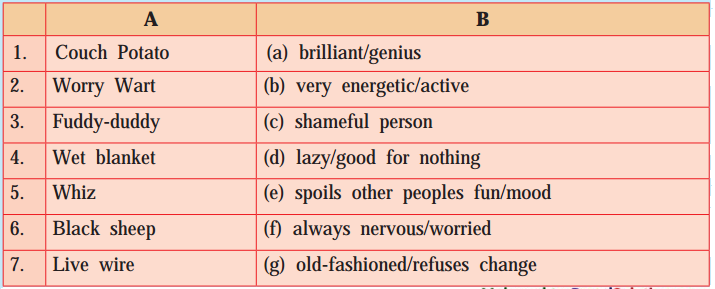
Answer:
Question 2.
Discuss with your group and write the difference in reactions of an Optimist and a Pessimist:

Answer:
| Answer | Optimist | Pessimist |
| Failure in exams /tests | I will try my level best in next exam. | Leave it. It is not my cup of tea. |
| Lose a good amount of cash | bad luck streak! | What a bad luck! |
| Unexpected rainfall/bad weather. | Let’s enjoy the rain. | Shit! this rain again. |
| Illness | I want to get well as early as possible. | I will die. |
| Extra classes in school | Teacher is going to teach something new. | What will it serve? It’s a waste of time. |
1. Complete the following table:
Question 1.
Complete the following table:
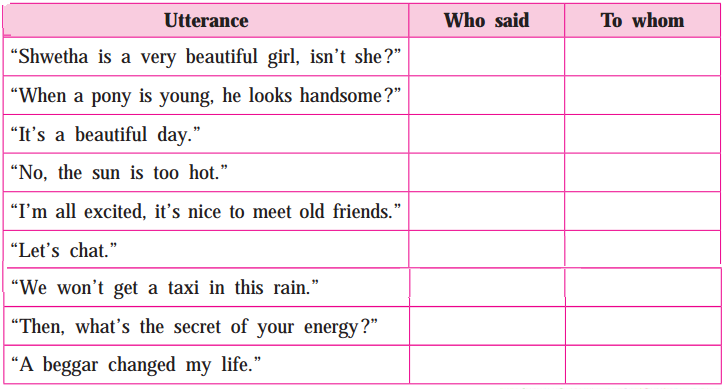
Answer:
| Utterance | Who said | To whom |
| 1. “Shwetha is a very beautiful girl, isn’t she?” | The writer | Meena |
| 2. “When a pony is young, he looks handsome.” | Meena | The writer |
| 3. “It’s a beautiful day.” | The writer | Meena |
| 4. “No, the sun is too hot.” | Meena | The writer |
| 5. “I’m all excited, it’s nice to meet old friends.” | Meena | The writer |
2. State whether the following statements are (✓) or (✗). Correct the wrong ones:
Question 1.
State whether the following statements are (✓) or (✗). Correct the wrong ones:
Answer:
(a) The author and Meena were Wrong great enemies.
Corrected sentence: They were good friends.
(b) Meena was a very cheerful Wrong person initially.
Corrected sentence: Meena was forever unhappy.
(c) Meena stayed alone in an Wrong apartment in Delhi.
Corrected sentence: She stayed alone in an apartment in Mumbai.
(d) Meena was the second child of Wrong her parents.
Corrected sentence: She was the only child of her parents.
(e) The author spotted Meena at Bombay’s Flora Fountain. [✓]
(f) The beggar and the young girl were playing on the road because there was a lot of traffic. [✗]
Corrected Sentence: The beggar and the young girl were playing on the road because there was no traffic.
(g) The scene of the beggar and the girl made Meena peep into her own life. [✓]
(h) The beggar became Meena’s role model. [✓]
(i) It took Meena almost two years to put the change into effect. [✓]
(j) Meena was able to give Gurudakshina directly to her Guru, the beggar. [✗]
Corrected Sentence: Meena gave Gurudakshina indirectly by sponsoring his granddaughter to a boarding school.
3. Choose the correct alternative and rewrite the sentences:
(Answers are directly given and underlined.)
Question (a)
Meena who is an LIC officer, is ………………… .
Answer:
Meena who is an LIC officer, is a pessimistic person.
Question (b)
The writer was standing near Akbarallys, a popular department store because …………………. .
Answer:
The writer was standing near Akbarallys, a popular department store because she was waiting for the rain to stop.
Question (c)
The only thought in the writer’s mind till they reached the Grand Hotel was ……………………. .
Answer:
The only thought in the writer’s mind till they reached the Grand Hotel was what had brought about such a change in Meena.
Question (d)
Meena sponsored the granddaughter of the beggar because ……………………………… .
Answer:
Meena sponsored the granddaughter of the beggar because it was a token of respect to the beggar.
4. How did the beggar change Meena’s attitude? Discuss with your partner Complete the following web.
Question 1.
How did the beggar change Meena’s attitude? Complete the following web with the help of the information from this passage:
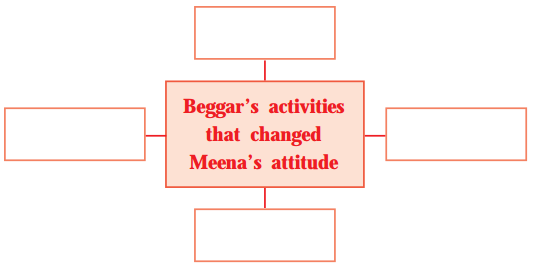
(Answer is directly given.)
Answer:
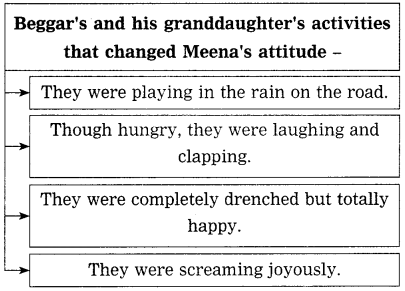
5. Write in your own words:
Question (A)
How did Meena show her gratitude to her guru?
Question (B)
Why would Meena be sad initially? Give reasons. Pick out sentences from the passage which prove that Meena was a pessimist.
Answer:
6. Find antonyms of the following words from the story.
Question (A)
Find antonyms of the following words from the story.
Answer:
Question (B)
Go through the points below showing Meena’s encounter with the beggar that transformed her completely. The sequence of events are jumbled up below. Arrange the events according to the occurrence. Fill in the number as per sequence.

Answer:
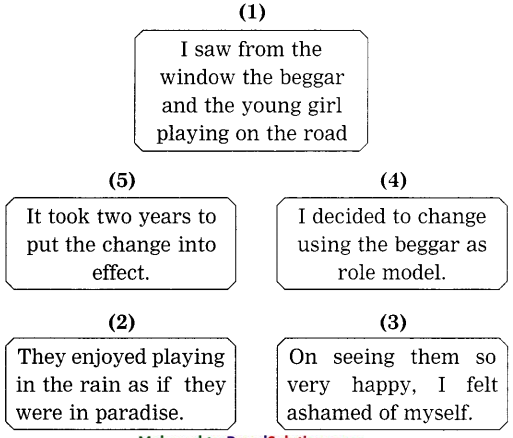
7. How did the beggar change Meena’s attitude towards life? Write it down in 5 to 6 lines.
Question 1.
How did the beggar change Meena’s attitude towards life? Write it down in 5 to 6 lines.
Answer:
8. Summarise the story with the help of the points given below.
Question 1.
Summarise the story with the help of the points given below.
(a) Meena’s initial attitude
(b) Meena’s meeting with Sudha Murthy in Mumbai.
(c) Beggar’s incident
(d) Change in attitude.
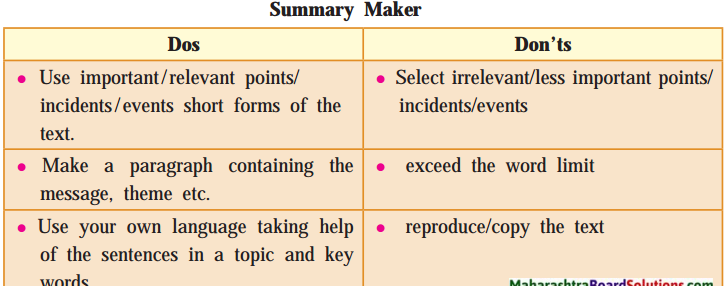
Answer:
Meena and Sudha were very good friends. Meena was an LIC officer and earning a good salary. But she was always unhappy and never had anything I positive to say on any subject or about any person. So whenever Sudha met her, she would start to feel depressed. Meena stayed alone in an apartment and had the habit of complaining about anything and everything; she wasn’t a very pleasant company and nobody wanted to visit her.
After some days Meena was transferred to Bombay and soon Sudha forgot about her. Many years later, Sudha was caught in the rain at Bombay’s Flora Fountain. She didn’t have an umbrella. She was standing near Akbarallys and waiting for the rain to stop. Suddenly she saw Meena. But her first reaction was to run. She was anxious to avoid being seen by her. But she couldn’t escape.
Meena saw her and caught hold of her hands ; warmly. She was very cheerful and excited to meet Sudha. She was also ready to get wet and walk in the rain. But Sudha was so surprised that she couldn’t believe she is meeting her pessimistic friend Meena. So she enthusiastically asked her, “Was there a Prince Charming who had managed to change her so?”
Meena told her there wasn’t anybody like that but a beggar changed her life who used to stay in front of her house with his five-years-old granddaughter. She used to give her leftover to that beggar everyday. One monsoon day she was surprised to see the beggar. As it was raining heavily, she couldn’t give anything to that beggar. She didn’t want to get wet in that pouring rain she was just looking out of her bedroom window when she saw the beggar and the young girl were playing on the road because there was no traffic.
They were enjoying the rain and laughing, clapping and screaming joyously as if they were in paradise. Hunger and rain did not matter. They were totally drenched but totally happy. That scene forced Meena to look at her own life. Even though she had so many comforts, none of which they had. But they had the most important of all assets one which she lacked.
They knew how to be happy with life as it was. So she decided to change her attitude towards life using the beggar as her role model. It took her almost two years to put the change into effect but now she finds happiness in every small thing, in every situation and in every person.
Sudha was surprised to listen to the changed story of her friend and asked Meena enthusiastically, whether she had given any gurudakshina to her guru or not. But Meena told her that the beggar was dead and she had sponsored his granddaughter to a boarding school as a mark of respect to him. Sudha was stunned but happy to hear the changed story and attitude of her friend.
9. Write the above summary making Meena the narrator. Begin with I worked in Bangalore in LIC. Sudha was my school friend …………..
Question 1.
Write the above summary making Meena the narrator. Begin with I worked in Bangalore in LIC. Sudha was my school friend …………..
Answer:
Lesson in a Life from A Beggar
I worked in Bangalore in LIC. Sudha was my good friend, living in the same city. Being pessimistic and having the habit of complaining about anything and everything, nobody was friendly with me. One day I was transferred to Mumbai and no one was in contact with me.
[Note: Students should try to complete the remaining part of summary of the story as told by Meena, in their notebook.]
Project:
Question 1.
Divide the class in four groups. Collect four different stories written by Sudha Murthy. Select a story for every group and write it in the form of a play. Enact it in front of the class.
Language Study:
1. Punctuate the following sentences:
Question 1.
(a) did you give any gurudakshina to your guru i asked.
(b) no there isnt anyone like that she said.
Answer:
(a) “Did you give any gurudakshina to your guru?” I asked.![]()
2. Add a suffix to the following words and make nouns.
Question (a)
Add a suffix to the following words and make nouns.
Answer:
1. Always be kind to poor, needy and disabled people in the society.
2. Why don’t you look happy today?
[Note : Students may frame sentences based on the remaining words on their own.]
Question (b)
Make four words (minimum 3 letters each). Using letters from the word ‘Pessimistic’.
Answer:
3. Change into indirect speech:
Question (a)
“Meena, it’s a beautiful day.” I said.
Answer:
I told Meena that it was a beautiful day.![]()
Question (b)
“Hey! I am really excited. It’s nice to meet old friends. What are you doing here?” Meena said to the writer.
Answer:
Meena exclaimed with excitement (joy) that it was nice to meet old friends. She further asked the writer what she was doing there.
Question (c)
“We won’t get a taxi in this rain,” I grumbled,
Answer:
I grumbled that we would not get a taxi in that rain.
Question (d)
“So what? We’ll buy an umbrella and then go to the Grand Hotel,” she said.
Answer:
Meena insistently asked her (the writer) what difference could it make and further told her that they would buy an umbrella and then go to the Grand Hotel.
Question (e)
“Did you give any gurudakshina to your Guru?” I asked.
Answer:
I asked her if she had given any gurudakshina to her guru.
My English Coursebook 10th Digest Chapter 3.2 A Lesson in Life from a Beggar Additional Important Questions and Answers
Simple Factual Activities:
Question 1.
Complete the following sentences:
(Answers are directly given and underlined.)
Answer:
1. Meena was a good friend of the writer.
2. The writer was caught in the rain at Bombay’s Flora Fountain.![]()
Question 2.
What is meant by ‘She never had anything positive to say’?
Answer:
It meant that her thoughts and actions had always been negative.
Question 3.
Who said to whom?
Answer:
| Sentence | Who said | To whom |
| 1. “Let’s chat.” | Meena | To the writer |
| 2. “We won’t get a taxi in this rain.” | The writer | Meena |
| 3. “Then, what’s the secret of your energy?” | The writer | Meena |
| 4. “A beggar changed my life.” | Meena | The writer |
State whether the following statements are Right or Wrong. Correct the wrong ones:
Answer:
Question 5.
State whether the following statements are Right or Wrong. Correct the wrong ones :
Answer:
Question 6.
Read the passage and fill in the blanks:
(Answers are directly given and underlined.)
Answer:
Complex Factual Activities:
Question 1.
What was Meena’s nature like?
Answer:
There was always something strange about Meena. She was always unhappy. Any person who came in contact with her would feel depressed. Her thoughts were negative about everything and about every person.
Question 2.
Arrange the following sentences in proper sequence according to their occurrence in the passage:
Answer:
Question 3.
Complete the following sentences:
(Answers are directly given and underlined.)
Answer:
Choose the correct alternative and complete the following sentences: (Answers are directly given and underlined.)
1. The only thought in the writer’s mind till they reached the Grand Hotel was what had brought about such a change in Meena.
2. The writer wanted to attend a dinner.
3. When the writer met Meena in a pouring rain, she was ready to make any number of adjustments.
4. A beggar had managed to change Meena.
Question 4.
What surprised the writer?
Answer:
The writer was greatly surprised by the difference in Meena’s attitude of bygone days. She looked happy and was smiling. That was not the same Meena the writer had known. She seemed ready to make any number of adjustments.
Question 5.
Choose the correct alternative and rewrite the sentences:
(Answers are directly given and underlined.)
Answer:
1. The writer took almost two years to put the change into effect.
2. The beggar and his granddaughter were enjoying the rain as if they were in paradise.
3. Attitude towards life was the most important of all assets, that the beggar and his granddaughter had but the writer was lacking.
Question 6.
Complete the web:
(Answer is directly given.)
Answer:
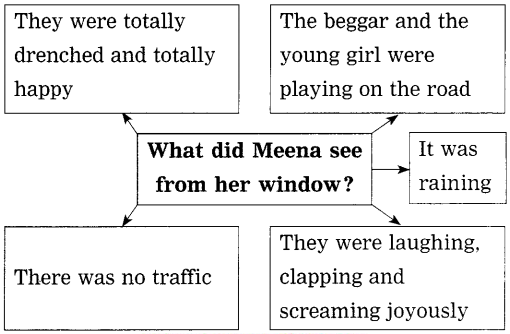
Question 7.
What lesson did Meena learn from her Guru-the beggar?
Answer:
From her Guru-the beggar, Meena learnt how to be happy with life as it was. She also learnt to find happiness in every small thing, in every situation and in every person.
Question 8.
What did Meena do to show gratitude to her Guru?
Answer:
Meena changed her attitude towards life using the beggar as her role model. Unfortunately, by the time she understood things, he was dead. So she sponsored his granddaughter to a boarding school as a mark of respect to him.
Activities based on Vocabulary:
1. Find antonyms of the following words from the passage:
Question 1.
Answer:
Question 2.
Match the following:
| Group ‘A’ | Group ‘B’ |
| 1. gloom | (a) to abate |
| 2. cynicism | (b) expecting the worst |
| 3. subside | (c) feeling of sadness |
| 4. pessimistic | (d) a distrustful attitude |
Question 3.
Add suffix to the following words and make nouns:
(a) good
(b) happy
(c) assure
(d) feel
(e) achieve
(f) strange
(g) popular
(h) excite.
Answer:
(a) goodness
(b) happiness
(c) assurance
(d) feeling
(e) achievement
(f) stranger
(g) popularity
(h) excitement
Question 4.
Find out synonyms for the following from the passage :
Answer:
Question 5.
Find the antonyms of the following from the passage:
Answer:
Question 6.
Write four words that have ‘ness’ as suffix :
Example – happiness
Answer:
Question 7.
Write two words that have ‘re’ as prefix :
Example – reassure
Answer:
Question 8.
Find synonyms for the following words from the passage:
(a) heaven
(b) happily
(c) rainy
(d) very surprised
Answer:
(a) Paradise
(b) Joyously
(c) Monsoon
(d) Dumbfounded.
Activities based on Contextual Grammar:
Make the following sentences negative:
Question 1.
She was forever unhappy.
Answer:
She was never happy.
Question 2.
Meena was a pessimistic girl.
Answer:
Meena was not an optimistic girl.
Choose the correct alternative of afffirmative sentence.
Question 1.
She wasn’t a very pleasant company.
(a) She was a very unpleasant company.
(b) She wasn’t a very unpleasant company.
(c) She was a very pleasant company.
(d) She was a very beautiful company.
Answer:
She was a very unpleasant company.
Question 2.
Make it exclamatory:
She was very cheerful.
Answer:
How cheerful she was!
Question 3.
Shwetha is a very beautiful girl.
(Choose correct alternative of exclamatory sentence.)
(a) How beautiful girl Shwetha is!
(b) What a beautiful girl Shwetha is!
(c) What a beautiful girl Shwetha was!
(d) What a beautiful girl is Shwetha!
Answer:
What a beautiful girl Shwetha is!
Question 4.
Complete the following table:
(Answers are directly given and underlined.)
Answer:
| Present Tense | Past Tense | Past Participle |
| 1. see | saw | seen |
| 2. pour | poured | poured |
| 3. bring | brought | brought |
| 4. know | knew | known |
Make the following sentences affirmative:
Question 1.
I couldn’t believe it.
Answer:
I was unable to believe it.
OR
I could hardly believed it.
Question 2.
I can’t stay with you tonight.
Answer:
I am unable to stay with you tonight.
Choose the correct tail tag for the following sentences from the brackets:
(wasn’t she?, will we?, were here?, weren’t there?,will you?, won’t you?)
Question 1.
We wont get a taxi in this rain;
Answer:
will we?
Question 2.
There were a few wrinkles in her face;
Answer:
weren’t there?
Question 3.
Give me your card,
Answer:
will you?
Question 4.
Meena was surprised by my question,
Answer:
wasn’t she?
Personal Response:
Question 1.
Would you avoid your friend, if you are meeting himher after a long time?
Answer:
Welcoming or avoiding our old friend totally depends upon how close you are with that person. If you are really close to some friend by heart and soul you will never avoid himher even if you are meeting himher after a long time. Whereas we always wait for such occasions to meet our old buddies.
Question 2.
What is meant by ‘ Meena never had anything positive to say ’?
Answer:
Meena was always pessimistic in her life. Whoever said or asked anything, her answer was always negative. She never thought positively. It was her habit to take everything negatively. So the writer said “Meena never had anything positive to say.”
Question 3.
What, according to you, is the difference between an optimistic person and a pessimistic person?
Answer:
According to me, an optimist enjoys every moment. Optimists are confident and hopeful in themselves and believe they can overcome whatever life throws at them and continue on their way. Pessimists always have negative thoughts. They always feel defeated. They are never hopeful and lose confidence. Pessimists are unhappy and gloomy.
Question 4.
Change is the law of life-Explain.
Answer:
Change is the law of life. And those who look only at the past or present are certain to miss the future. Change is inevitable. We can’t ignore it. Changing means doing something new and challenging. That gives you a great joy of life. If we do not change ourselves, we cannot enjoy our life to the fullest.
Question 5.
Is it possible to bring change in our life like Meena?
Answer:
Yes, it is definitely possible to bring change like Meena in our life also. We can learn a lot from the examples and attitudes of other less-gifted people. If we have clear (good) conscience and we are determined to act according to it, we can surely | change our behaviour, attitude towards our life like Meena.
Question 6.
Describe an experience, where somebody has changed your way of looking at life.
Answer:
Once while travelling by a bus, I came across one of my friends with whom I had a quarrel on a petty thing. I ignored him and asked the conductor to give a ticket by giving a 100-rupee note.
The conductor had no change so he told me to get down and come by another bus. I was about to get down when my friend came forward and paid for my ticket. I felt ashamed and asked him to pardon me. The incident changed my attitude about him and now we are friends forever.
Question 7.
According to you, how can we help beggars?
Answer:
We should convince beggars that begging is not good. We should tell them the importance of ‘Self respect.’ If possible we will provide them opportunities to earn money and insist them to give up begging.
Do as directed:
Question 1.
They were laughing and screaming.
(Choose the correct option of ‘Not only-but also’)
(a) They were not only but also laughing and screaming.
(b) They were not only laughing but also screaming.
(c) They were laughing not only but also screaming.
(d) They were not only laughing and but also screaming.
Answer:
(b) They were not only laughing but also screaming.
Question 2.
He used to stay in front of my house.
(Rewrite the sentence by using ‘would’)
Answer:
He would stay in front of my house.
Change the voice:
Question 1.
That scene forced me to look at my own life.
(Begin the sentence with “I )
Answer:
I was forced to look at my own life by that scene.
Question 2.
I find happiness in every small thing in every situation and in every person.
(Begin the sentence with “Happiness ….)
Answer:
Happiness is found in every small thing, in every situation and in every person by me.
1. Attempt anyone:
Question (a)
Make a meaningful sentence by using given phrase: ‘in the pursuit of’
Answer:
In the age of technology everyone is in the pursuit of money.
OR
Question (b)
Add a clause to expand the following sentence meaningfully.
My friend is an LIC Officer ……………
Answer:
My friend is an LIC Officer who stays at Nagpur.
2. Attempt any one:
Question (a)
Add a prefix or suffix make new words :
Note: Two words will be given in the activity sheet.
(a) kind
(b) happy
(c) ignore
(d) assure
(e) imagine
(f) depute
(g) manage
(h) assess
Answer:
(a) kindness, unkind.
(b) unhappy, happiness
(c) ignorance
(d) assurance
(e) imagine
(f) deputation
(g) management, mismanage
(h) assessment,
Activities based on Language Study:
Question 1.
Complete the words by using correct letters:
Answer:
Question 2.
Put the words in alphabetical order:
1. chronic, squeezing, assets, zest.
2. pleasant, parents, paradise, pause.
Answer:
1. assets, chronic, squeezing, zest.
2. paradise, parents, pause, pleasant.
Question 3.
Punctuate the following sentences:
then whats the secret of your energy i asked
Answer:
“Then, what’s the secret of your energy?” I asked.
Question 4.
Write related words as shown in the example:
(Answers are directly given and underlined.)
Answer:
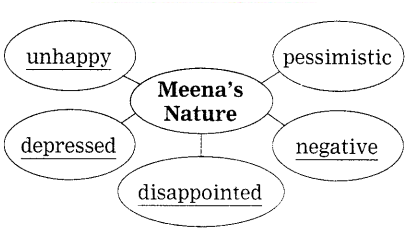
Question 5.
Complete the word-chain of ‘nouns’. Add four words, each beginning with the last letter of the previous word:
friend, → d …………, …………., …………, ………….,
Answer:
friend → dream , minute , elephant , thief.
Projects Task:
Question 1.
Find out more about Sudha Murthy and her writing from the internet.
You must be logged in
to post a comment.